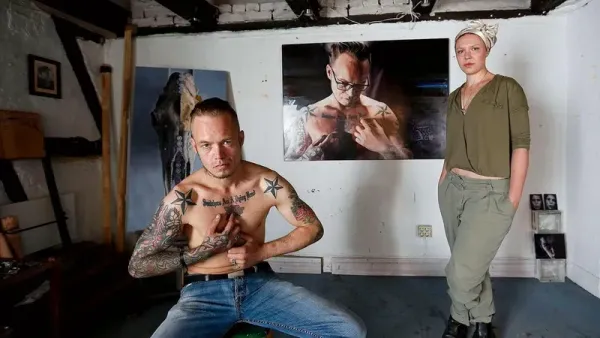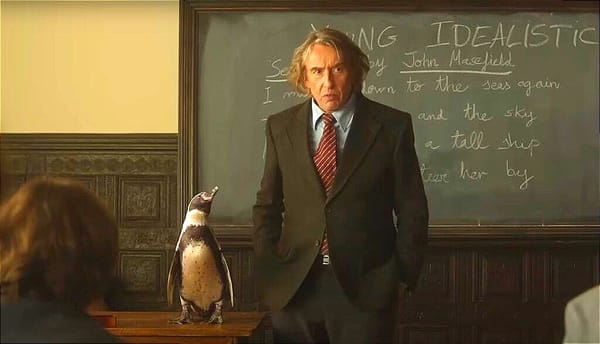What To Watch: "Athena" and "Triangle of Sadness"
Plus: "Catherine Called Birdy" and '80's horror films
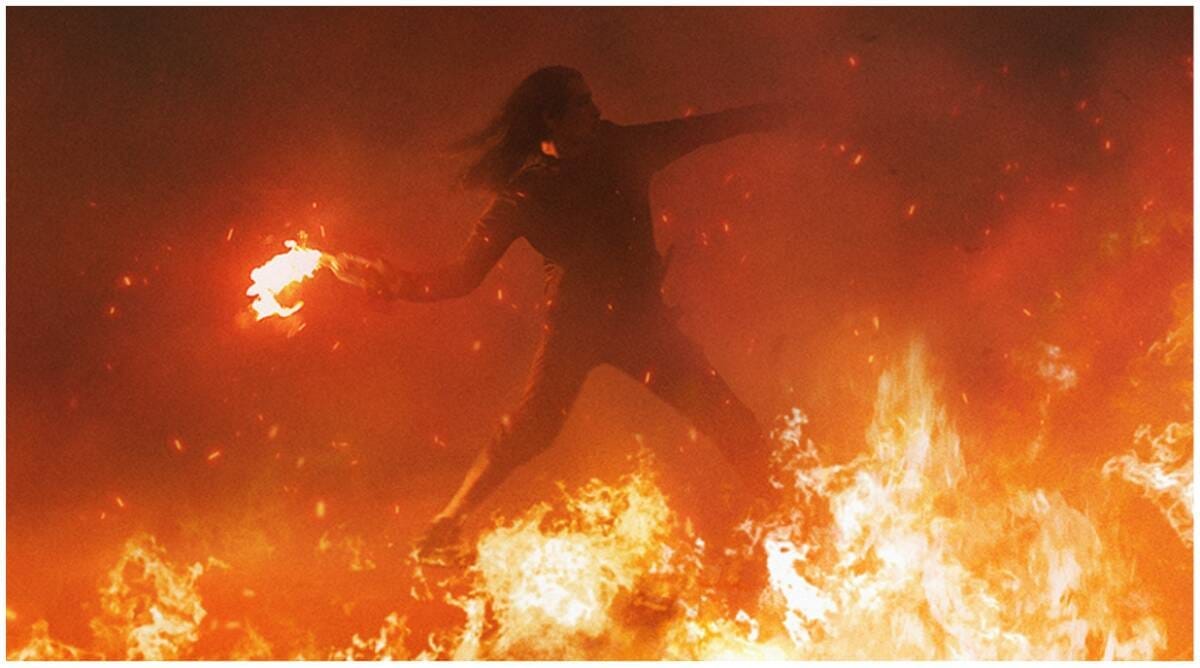
The opening moments of “Athena” (⭐ ⭐ ⭐½ out of ⭐ ⭐ ⭐ ⭐), a new French film streaming on Netflix, are as electrifying as anything I’ve seen in a movie all year. In one long tracking shot that swivels and stretches for 11 jaw-dropping minutes, a police-department press conference following the death of a teenage boy in custody suddenly turns into a war zone as an army of immigrant Arab kids from a nearby high-rise slum charges the station in a carefully planned blitzkrieg. Director Romain Gavras and his cameraman Matias Boucard weave us in and out of the chaos with clarity and a sure sense of place, and they make certain we attend to the shaggy-haired young man directing his troops: Karim (Sami Slimane), brother of the dead boy and a kid possessed with the charisma of a born general.
You’d think that “Athena” would have to let up after that beginning – a sort of “Assault on Precinct Treize” as told from the viewpoint of the invaders. Astonishingly, the movie only tightens its grip. As Karim’s army retreats to their decrepit apartment complex – named Athena, not coincidentally after the goddess of war – the youths settle in for a protracted siege and seething counterattack that unfolds over the course of a day and a night and that includes a tormented family melodrama. Karim has two older brothers as well: Abdel (Dali Benssalah), a decorated Iraq War veteran we first see working with the police to find his little brother’s killers, and Moktar (Ouassini Embarek), the drug kingpin who rules over Athena with a murderous fist.

So, four brothers: The good son, the bad seed, the victim, and the warrior. If that feels overly tidy as narrative, it adds to the sense we’re watching something mythic and elemental. (We get a glimpse of their mother and their sister, but this is very much a movie ruled by testosterone, oppressive and/or aggrieved.) In addition, a wanted radical terrorist (Alexis Manenti) is hiding out in Athena, tending to the garden and remaining eerily calm, and there’s a raw young policeman (Anthony Bajon) who straps into his tactical riot gear with a look of palpable terror. The movie is such a pulsating crowd scene – 21st-century social commentary by way of Hieronymus Bosch – that anyone picked out of the mosh pit is already heavy with dramatic purpose.
“Athena” is surprisingly schematic as narrative, and it doesn’t pretend to offer any solutions, which has turned some critics against it. The film isn’t political; it just is: a brilliantly choreographed powder keg of poverty and powerlessness, French division, exploding in a day-after-tomorrow Judgment Day. One might accuse director Gavras of slumming – the son of the acclaimed Greek-French filmmaker Costa-Gavras, he’s best known for music videos and advertisements – but the presence of Ladj Ly as co-writer (with Gavras and Elia Belkeddar) and in a small role provides ballast, since Ly grew up in the banlieues of Paris and directed 2019’s fine, Oscar-nominated “Les Misérables.” That film nicked the Victor Hugo title for a fiery policier set on Ly’s home turf; its final scenes hinted at a social apocalypse to come. With “Athena,” the apocalypse is here. At least one reviewer has called it the best film of the year. I wouldn’t go that far – yet – but it’s been quite a while since I watched a movie in a constant fugue state of tension and admiration.
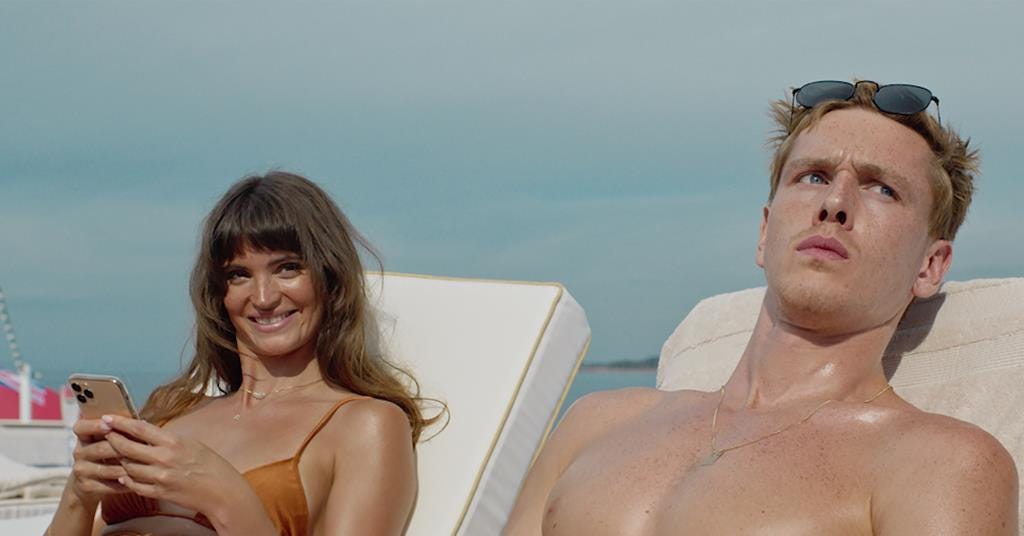
“Blunt force Buñuel” is a good way to describe the films of Ruben Östlund, the Swedish writer-director who came to international attention with “Force Majeure” (2014), about a bourgeoise patriarch undone by an avalanche. Östlund won his first Cannes Palme d’Or with “The Square” (2017), which brutally satirized the European contemporary art scene, and he won his second with this year’s “Triangle of Sadness” (⭐ ⭐ ⭐ out of ⭐ ⭐ ⭐ ⭐), which arrives in select theaters today before going into wider release next week. If you recall the recent HBO series “The White Lotus,” about pampered rich idiots at a tropical resort, you’ll be prepared for “Triangle,” which adds a splendid effusion of bodily fluids to the class-war formula as well as a tip of the hat to the Lina Wertmuller classic “Swept Away”
Presented in three chapters, the film steadily widens its gaze and sharpens its axe. We begin with Carl and Yaya; he (Harris Dickinson, above right) is an up-and-coming male model and she (Charlbi Dean, above left) is a wildly successful social-media influencer. They’re vain, fatuous, and in love, or so they think, although Carl, who comes from a scrabbly British background, is insecure about making less money than Yaya. There’s a long, awkward restaurant argument about who will pay the check – who should pay the check – that’s really about power and control, the first of many instances in “Triangle of Sadness” where capital crashes the soiree and pees in the punchbowl. “I don’t like talking about money,” insists Yaya. “It’s unsexy.” In fact, sex is as transactional as everything else in their lives, and so, it turns out, is love.
The middle section of the triptych — and the movie’s outrageous centerpiece — takes place aboard a luxury cruise for the wealthiest of the wealthy, Carl and Yaya traveling free so she can post about it. (She spends minutes posing in the dining room with a plate of pasta she’ll never eat because she’s gluten intolerant.) Fellow passengers include a Russian fertilizer mogul (Zlatko Buric), a sweet old pair of arms merchants (Amanda Walker and Oliver Ford Davies), and a billionaire coder (Henrik Dorsin), while the crew is overseen by the efficient head purser (Vicki Berlin), leading her underlings in a gleeful chant about the tips they’ll be making. Oh, and the ship’s captain (a tremendous Woody Harrelson) is a committed Marxist who’s finally thrown in the towel and retreated to his cabin, pickling himself in bourbon and cynicism.
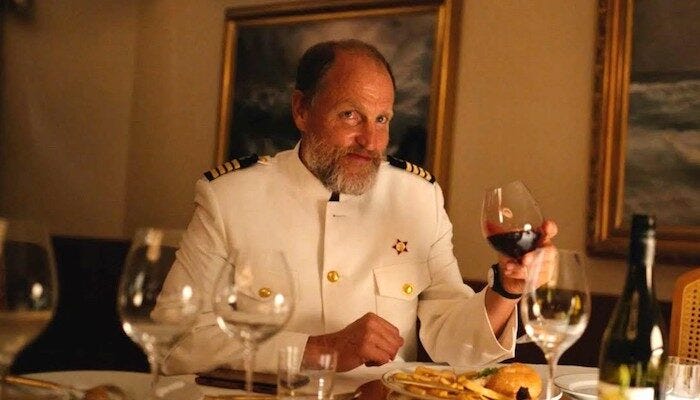
All these marbles roll around the deck and collide most memorably in a storm-tossed dinner scene that may have no equal in cinema history for its sheer expulsive exuberance. Maybe the Mr. Creosote scene in “Monty Python and the Meaning of Life” (“Would you like a wafer-thin mint?”), but maybe not. Let’s just say there was a reason they handed out vomit bags at the press screening. The sequence goes on and on, worsens and worsens, until it takes on a kind of surreal magnificence: The ship of fools has become a voyage of the undammed. You may want to skip the popcorn.
“Triangle of Sadness” could have ended there and we might have gone home bilious but happy. There’s a third chapter, though, and I’ll spare you the details, other than to say that the class tables of prat and prole get overturned in a way that’s at first deliciously funny, then fairly strained, and finally overlabored. (It’s still pretty worth it for Dolly De Leon’s performance as a newly crowned queen of the island.) Like “The Square,” “Triangle of Sadness” is two and a half hours; like “The Square,” it overstays its welcome by at least 20 minutes. But Östlund has characters and metaphors to bludgeon, and the joie de vivre with which he lays waste to the idle rich and the system that keeps them in caviar and cruelty is amusingly obvious until it’s just obvious. Buñuel, by contrast, wielded a stiletto with a discreet smile, and his movies still draw blood decades after they were made.
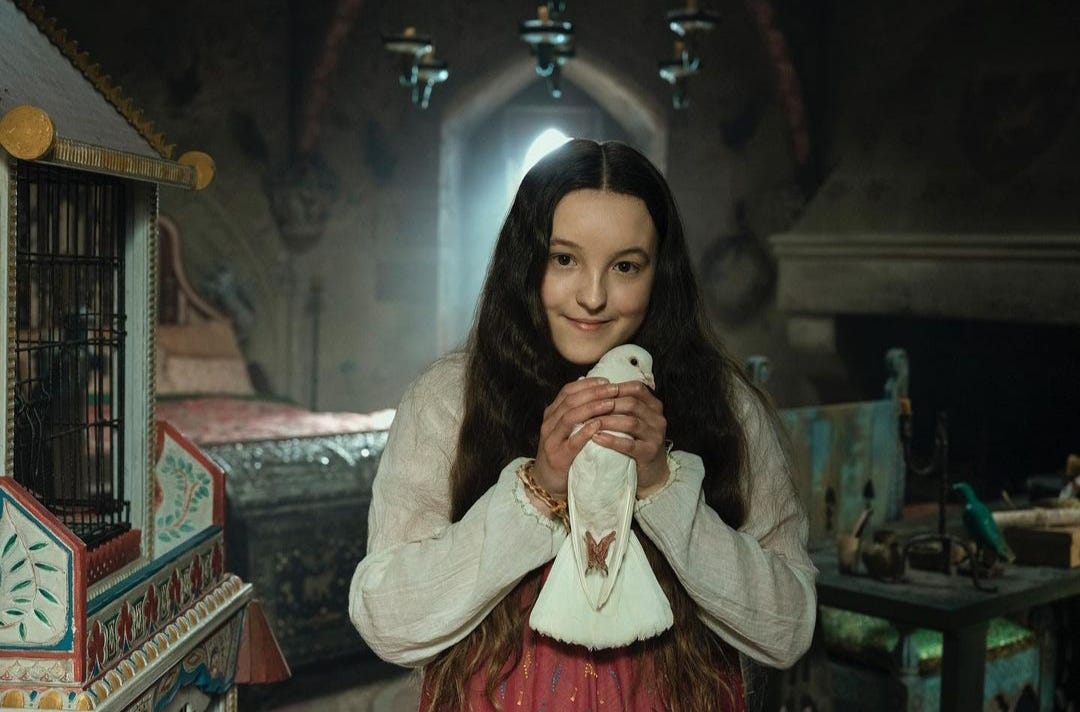
It seems that every time we’re done with Lena Dunham, she turns around and does something good. Earlier this week, the writer-director-actress was being properly pilloried on social media for a tweet that said, essentially, “I’m such a great ally I should have my casket on a float in the Gay Pride parade when I die.” Today, her most recent – and most commercial – film as director comes to Amazon Prime: an unexpected charmer called “Catherine Called Birdy” (⭐ ⭐ ⭐ out of ⭐ ⭐ ⭐ ⭐). It’s based on a Young Adult novel of the same name that won the Newbery Award in 1995, and it’s good enough that you don’t necessarily need a teenage girl to watch it with (although it couldn’t hurt).
The film’s ace in the hole is Bella Ramsey (above) in the title role of a 14-year-old coming of age in 14th-century England. You remember Ramsey if you suffered through the final seasons of “Game of Thrones” – she was the audience favorite Lyanna Mormont, a battle-savvy child with the mind of a Machiavellian royal. As Mormont, Ramsey had a deadpan that was fearsome to behold; as Lady Catherine, rebellious daughter to local lord of the manor Rollo (Andrew Scott, the hot priest himself), she gets to uncork a wide variety of expressions, all of them employed by teenage girls since time began. The Lord has fallen on hard times, and only marrying “Birdy” off to a rich nobleman will keep the family from destitution; her responses to the various suitors sent her way are pretty much on a par with how Harold dealt with his prospective girlfriends in “Harold and Maude.”
Underneath the japery and Ramsey’s genuinely high-spirited performance is a cry of dismay at the idea of women as property, an idea (I don’t have to tell you) that continues to have bleak relevance today. Dunham keeps the didacticism light until it’s time to sharpen her spear; it matters that it’s a movie with few villains except the society in which the characters live and those most invested in upholding it. “Catherine Called Birdy” is also refreshingly frank about menstruation and other bodily matters (even if Birdy herself is oddly naïve); if you do watch it with an age-appropriate child, expect to have some good, gnarly conversations afterwards — and maybe expect to do more listening than talking.
It's October, which means it’s monster-madness time. If you subscribe to the Criterion Channel, there’s a just-launched “’80’s Horror” collection that packages 29 films from such genre stalwarts as Tobe Hooper, David Cronenberg, John Carpenter, and more. My must-sees might include “Basket Case,” “Q: The Winged Serpent,” “Henry: Portrait of a Serial Killer,” “The Hidden,” and “Near Dark,” with two films in particular – Ken Russell’s “The Lair of the White Worm” and the gravely misunderstood Nicolas Cage classic “Vampire’s Kiss” – worthy of their own posts. Keep an eye peeled (eww).
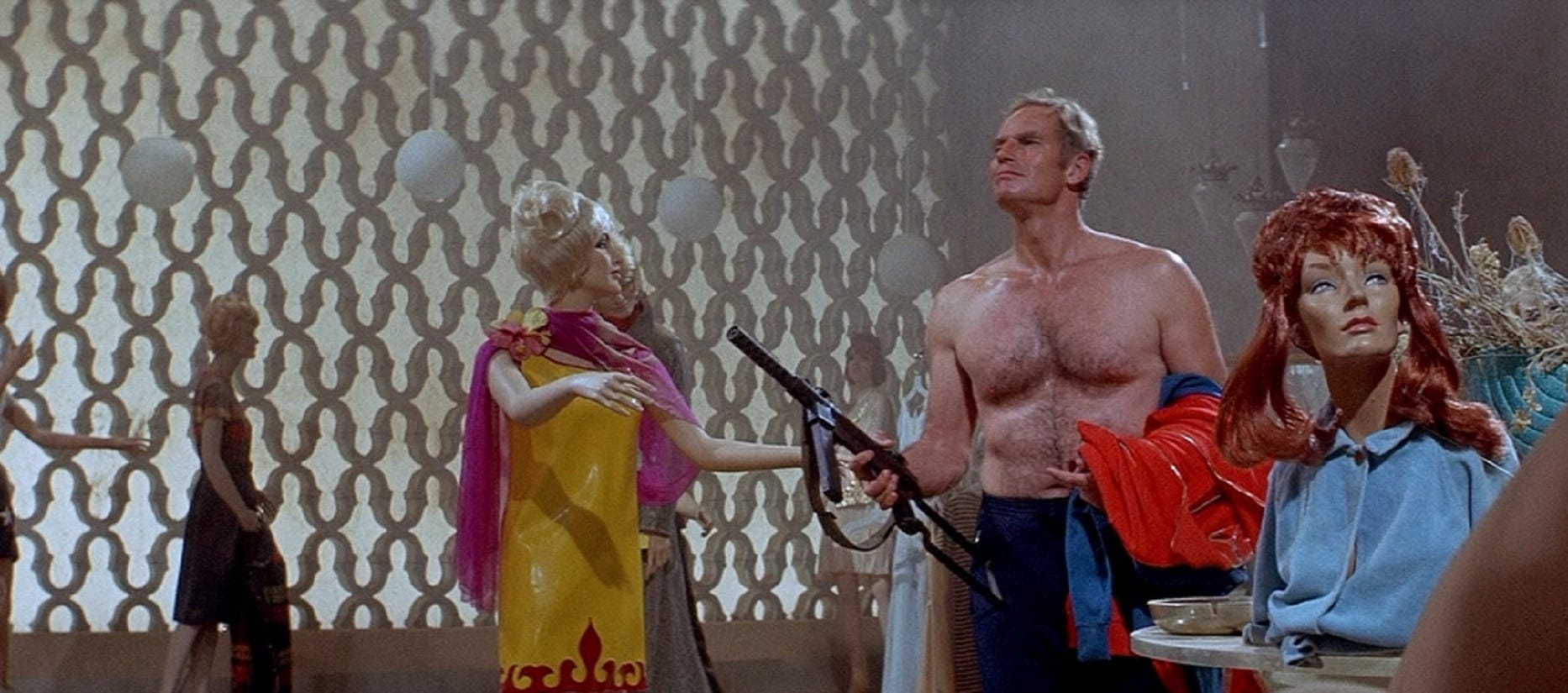
DVR alert: If ’70’s horror is more your jam, “The Omega Man” (1971) is playing on Turner Classics this Saturday night at 6:15. The second of three (at least) adaptations of Richard Matheson’s 1964 sci-fi novel “I Am Legend,” it casts manly Charlton Heston (above) in his post-“Planet of the Apes” prime as the soul human survivor in a New York City full of mutant vampires. This one freaked me right out when I saw it at age 14 at the Sack 57 Cinema in Boston’s old Combat Zone. On a double bill with “Willard.” They don’t make ’em like that anymore, for which I am sometimes thankful and sometimes not.
If you enjoyed this edition of Ty Burr’s Watch List, please feel free to share it with friends.
If you’re not a paying subscriber and would like to sign up for additional postings and to join the discussions, here’s how:


